Since it was established in 1968, the International Baccalaureate Organisation (now known as International Baccalaureate) has established a global reputation as one of the world’s most respected school-leaving examination boards with 4,632 affiliated schools in 146 countries worldwide - Dilip Thakore
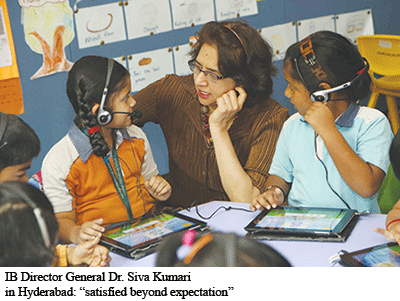 Plans and programmes — including workshops, lectures and celebratory functions to honour and award tutors and mentors — are being drawn up in the Geneva (Switzerland) and The Hague (Netherlands) head offices, and Singapore and Washington DC regional offices of the International Baccalaureate (IB, formerly International Baccalaureate Organisation, estb. 1968), which over the past half century has established a reputation as one of the world’s most admired school-leaving (class XII) examination boards. In the year 2016 (the IB board switched to the July/June financial year), 85,708 school-leaving students in 146 countries around the world — including 3,403 in India — wrote the rigorous IB Diploma (IBD) examination in three languages (English, French, Spanish), of whom 80 percent passed and were accepted into 2,192 universities (including 1,333 in the US), which have recognised “with published policy statement” the IB Diploma as an excellent qualification for entry into undergrad study programmes.
Plans and programmes — including workshops, lectures and celebratory functions to honour and award tutors and mentors — are being drawn up in the Geneva (Switzerland) and The Hague (Netherlands) head offices, and Singapore and Washington DC regional offices of the International Baccalaureate (IB, formerly International Baccalaureate Organisation, estb. 1968), which over the past half century has established a reputation as one of the world’s most admired school-leaving (class XII) examination boards. In the year 2016 (the IB board switched to the July/June financial year), 85,708 school-leaving students in 146 countries around the world — including 3,403 in India — wrote the rigorous IB Diploma (IBD) examination in three languages (English, French, Spanish), of whom 80 percent passed and were accepted into 2,192 universities (including 1,333 in the US), which have recognised “with published policy statement” the IB Diploma as an excellent qualification for entry into undergrad study programmes.
The big bang celebrations being planned around the globe to usher in the golden jubilee of this European international syllabus/curriculum formulation and examinations board established with the mission to “develop inquiring, knowledgeable and caring young people who help to create a better and more peaceful world through intercultural understanding and respect”, are justified. Over the past five decades, through hard-grind research of best pedagogy practices worldwide, the UK and US in particular, the IB trustees and management have successfully developed an integrated and continuously evolving primary-higher secondary syllabus which has been enthusiastically embraced by knowledgeable educationists and university admission officers around the world. The number of affiliated schools — known as IB World Schools — has risen to 4,632 in 146 countries in 2016 despite this European board mandating stringent affiliation terms and conditions, including mandatory teacher training by IB professionals, and a two-year pre-affiliation school preparation programme.
Little wonder that Dr. Siva Kumari, the Den Haag (The Hague), Netherlands-based first woman director-general of IB, is “satisfied beyond expectation” that this Geneva/Hague-based examination board established half a century ago with the modest aim of prescribing and providing standardised school-leaving education for the children of diplomats subject to short-notice transfers and postings, has developed into arguably the world’s most respected international school examinations board.
“Fifty years ago the highly prescient founders of IB discerned the need for educating and nurturing a new generation of youth with global perspective — problem-solvers committed to world peace and cooperation. Since then due to the dedicated efforts of educationists and educators within the organisation, IB has evolved into a full-spectrum school education board providing well-designed curriculums to over 4,600 affiliated primary to higher secondary schools in 146 countries internationally. Nor is it true that the focus of IB — a non-profit foundation — is restricted to private schools as popularly believed. A large and growing number of government schools in the US, Australia and the Netherlands are also affiliated with us,” says Siva Kumari. An alumna of St. Joseph’s College, Visakhapatnam and University of Cincinnati with a Ph D in education technology from University of Houston (Texas), Dr. Siva Kumari acquired over 15 years of teaching and administrative experience of K-12 education in the US, before she signed up with IB in 2009, and was appointed its first woman director-general in 2014.
Siva Kumari’s pride in the steady growth of IB into a full-fledged schools affiliation and examinations board with international acceptability is not unwarranted. Some of the world’s most respected schools have adopted one or more of IB’s school curriculums — PYP (primary years programme), MYP (middle years programme), the school-leaving higher secondary (class XII) IB Diploma, and the recently introduced IB Career diploma. Among them: Charterhouse, Sevenoaks and Sherbourne School for Girls (UK); EF Academy, British International School of Boston, Valencia High School, Brooke Point High (USA); and Pembroke School and Gilmore College (Australia).
IB’s unique and rigorous two-year IB Diploma Progamme for class XI and XII requires students to choose three subjects at a higher study level (240 teaching hours) and three at standard level (150 hours) from among six subject groups (language and literature, language acquisition, individuals and society, sciences, maths and the arts) supplemented by three unique ‘DP Core’ subjects (theory of knowledge, extended essay and creativity, activity and service) over two years. This broad cross-disciplinary curriculum mixed with experiential education has greatly impressed knowledgeable educationists and parents around the world intent on school-leaving teens acquiring sufficient knowledge and initiative to be able to derive the full benefit of undergrad and higher education.
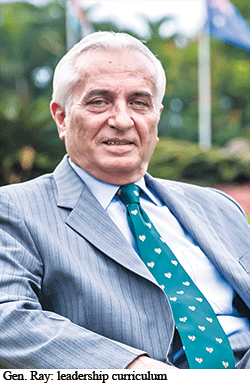 The consensus among genuine educationsits and educators is that the rigorous 24-month higher secondary diploma programme offered by IB World Schools — in particular the compulsory theory of knowledge (which requires students to study and investigate how knowledge is created), extended essay (students conduct independent research on a chosen subject and write a 4,000 word essay) and the creativity, activity service (CAS, which requires all students to undertake a community project demonstrating creativity, activity and service) — is far broader and deeper than the standard higher secondary streamed syllabuses prescribed by India’s most respected CISCE and CBSE examination boards and arguably even the international CIE (UK) board.
The consensus among genuine educationsits and educators is that the rigorous 24-month higher secondary diploma programme offered by IB World Schools — in particular the compulsory theory of knowledge (which requires students to study and investigate how knowledge is created), extended essay (students conduct independent research on a chosen subject and write a 4,000 word essay) and the creativity, activity service (CAS, which requires all students to undertake a community project demonstrating creativity, activity and service) — is far broader and deeper than the standard higher secondary streamed syllabuses prescribed by India’s most respected CISCE and CBSE examination boards and arguably even the international CIE (UK) board.
Following the historic liberalisation and deregulation of Indian industry and the economy in 1991, when it became easier for forward-looking education entrepreneurs and philanthropists to promote internationally benchmarked schools — in the heyday of the licence-permit-quota regimen ordained by post-independence India’s neta-babu (politician-bureaucrat) brotherhood, it took 30 years of sustained lobbying before the country’s first (IB-affiliated) international school (Mahindra United World College, Pune) was permitted to become operational) — the Indus International School, Bangalore (IIS-B, estb.2003) was one of the first in the country to opt and qualify for IB affiliation. Since then, IIS-B (which has spawned clones in Hyderabad and Pune) 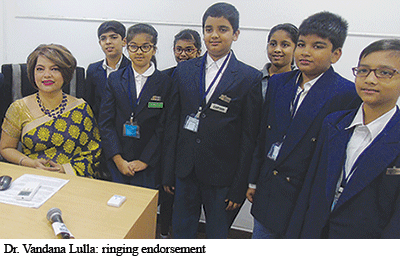 has risen high in the public esteem. For the past five years, this co-ed fully IB school which has 1,207 students from 31 countries on its muster rolls, has been ranked India’s #1 international day-cum-boarding school in the annual EducationWorld India School Rankings.
has risen high in the public esteem. For the past five years, this co-ed fully IB school which has 1,207 students from 31 countries on its muster rolls, has been ranked India’s #1 international day-cum-boarding school in the annual EducationWorld India School Rankings.
“The curriculum developed by IB after decades of intensive research was the obvious choice of the trustees and management of IIS-B, since our institutional objective is to develop future leaders of industry, business, government and the services. The higher secondary IB Diploma programme — and even the PYP and MYP programmes — are designed to stimulate creativity, critical thinking and research skills of children from early age. It is inter-disciplinary, experiential and encourages students to discern and grab opportunities. It invests our students with 21st century competencies and fully prepares them not only for university, but for life,” says Lt. Gen (Retd) Arjun Ray, ab initio chief executive of the Indus Trust which has promoted IIS-B, in a ringing endorsement of the board.
|
International Baccalaureate history
The International Baccalaureate Organisation (now known as IB) traces its origin to the post World War II years when Europe was devastated by the First World War (1914-18) and Second World War (1939-45). More than 35 million soldiers and 70 million civilians were killed in these two great wars. In 1948, Geneva-based educationist Marie-Thérèse Maurette wrote a book Educational Techniques for Peace. Do They Exist? This seminal work provided the framework for the IB Diploma Programme (IBDP), a two-year school-leaving curriculum for higher secondary students. In the mid-1960s, a group of teachers from the International School of Geneva promoted the International Schools Examination Syndicate which transformed into the International Baccalaureate Organisation, which was registered as a non-profit education trust in 1968.
Initially established as a curriculum development and examinations board for children of diplomats, employees of international peacekeeping and development organisations such as the United Nations’ World Health Organisation, Food & Agriculture Organisation, and multinational business corporations, IB quickly established a reputation as a provider of high quality interdisciplinary pre-university education. Based on the work of Marie-Thérèse Maurette and Oxford University don Alec Peterson, author of Arts & Science in the Sixth Form (1960), the IB trustees, who had developed the philosophy, structure, content and pedagogy of the IB Diploma higher secondary programme in 1962 incorporated into the curriculum the idea of broader education with some degree of specialisation and ethics in science to ensure that humanities students are introduced to the “beauty of mathematics”, critical analysis, and learn four (instead of three) subjects spread over the humanities and sciences.
In 1967, the IB’s uniquely distinctive Theory of Knowledge subject was added to the curriculum followed by Creativity, Activity and Service (1968) and Extended Essay (1974). These three sui generis subjects constitute the ‘core’ of the IB Diploma programme.
Encouraged by the enthusiastic response of idealists and educationists to the IB Diploma programme, in 1994 — by when the number of affiliated schools in the Americas (IBA), Europe & Middle East (IBAEM) and Asia Pacific (IBAP) had risen to 400 — the board introduced its middle years programme (MYP) for children in the age group 11-16. In 1997, this process of downward integration was completed with introduction of the board’s primary years programme (PYP) and the higher secondary IB Career Programme (IBCP) in 2012.
Since then, the number of IB-affiliated schools worldwide (known as IB World Schools) has risen to 4,632 (including 2,827 in the Americas — mainly USA) offering 6,033 IB learning programmes (as on February 15, 2017). In India, the number of IB World Schools has grown to 137, including 25 ‘continuum schools’ (offering all three — PYP, MYP and the IBDP) — curriculums.
|
Dr. Vandana Lulla, an alumna of Bombay University and Open International University, Colombo and currently director of the continuum (full-fledged) IB-affiliated Podar World School, Worli and Podar International School, Santacruz (both in Mumbai) which have an aggregate 2,500 students and 203 teachers on their rolls, conducted a ten-year study of curriculums prescribed by examination boards worldwide before recommending IB affiliation to the trustees of the Podar World School (estb.2003), and again for Podar International (2015). “I have no doubt in my mind that the IB curriculum best develops the critical thinking, interpretation, communication and decision-making skills of children. The theory of knowledge, extended essay and CAS are unique in K-12 education and an IB Diploma holder is as well-qualified as a second year undergrad of a top Indian university,” says Lulla.
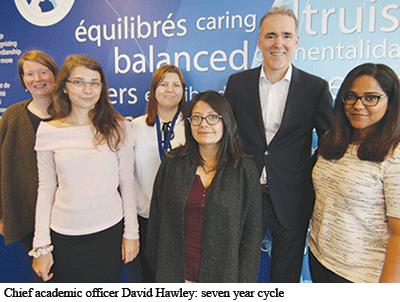 If the IB’s prescribed curriculum has sufficiently impressed school promoters and principals round the world to queue up for affiliation, the secret of success of the world’s fastest growing international exams board is deep and continuous syllabus/curriculum development and innovation. According to chief academic officer Dr. David B. Hawley, IB is at the forefront of developing modern teaching-learning pedagogies. The organisation’s research unit within the academic department has innovated a seven year cycle for continuously developing and contemporising the syllabuses/curriculums prescribed for its 4,632 affiliated schools worldwide.
If the IB’s prescribed curriculum has sufficiently impressed school promoters and principals round the world to queue up for affiliation, the secret of success of the world’s fastest growing international exams board is deep and continuous syllabus/curriculum development and innovation. According to chief academic officer Dr. David B. Hawley, IB is at the forefront of developing modern teaching-learning pedagogies. The organisation’s research unit within the academic department has innovated a seven year cycle for continuously developing and contemporising the syllabuses/curriculums prescribed for its 4,632 affiliated schools worldwide.
The trustees and top management of the IB are fully committed to researching global best practices in primary to higher secondary education to develop the best school curriculums. Our objective is to prepare students to accept the challenges to succeed in the newly emerged global business and diplomatic environment. Therefore curriculum development within IB is an on-going process, with a substantially renewed curriculum presented every seven years. In this cycle the initial two years are expended in identifying and studying global best practices in school education. During the next three years the best practices short-listed are thoroughly discussed and debated with heads and teachers of our affiliated schools, expert educationists in universities and with leaders of industry. And over the next two years, the revised and contemporised curriculums are translated into French, Spanish and six access languages,” says Hawley who adds that the elaborate and detailed curriculum advancement process in the IB is influenced by the extensively researched books of US-based educationist David N. Perkins, author of Smart Schools — Better Thinking & Learning for Every Child (1995), Making Learning Whole (2010) and Future Wise — Educating Our Children for a Changing World (2014).
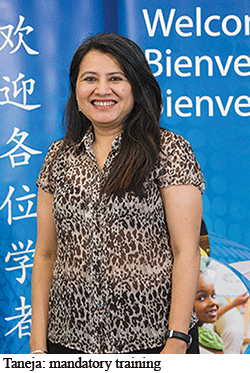 An alum of Framingham University, Massachusetts with a Masters and Ph D from the Harvard School of Education, Hawley began his academic career as university lecturer in Gautemala, Venezuela and Costa Rica before switching to school education. After that he acquired over 25 years of teaching experience including 20 years as head of several international schools prior to taking charge as chief academic officer at IB, Hague where he heads a 50-strong strong team.
An alum of Framingham University, Massachusetts with a Masters and Ph D from the Harvard School of Education, Hawley began his academic career as university lecturer in Gautemala, Venezuela and Costa Rica before switching to school education. After that he acquired over 25 years of teaching experience including 20 years as head of several international schools prior to taking charge as chief academic officer at IB, Hague where he heads a 50-strong strong team.
But although continuous curriculum research, innovation and contemporisation is at the heart of IB’s operations and its USP (unique selling proposition) which has excited and attracted progressive educationists and school educators around the world, it’s not the be all and end all of this European school examinations and affiliating board. Its carefully conceptualised curriculum is supplemented by a full suite of services which support curriculum delivery in IB World Schools globally. And perhaps the most important supportive service this board provides is its thorough teacher training and development programme delivered directly by IB master trainers and mandatory for all affiliated schools.
When a school from any country applies for affiliation, after IB officials check out its infrastructure, the applicant school is given provisional affiliation or candidacy period of two years during which its teachers are obliged to undergo rigorous training and are drilled with the IB philosophy of education and are thoroughly prepared to deliver the board’s curriculum. Initially affiliation-applicant schools are obliged to request (and pay for) face-to-face workshops at which IB professionals run them through the curriculum and teach them the basic principles of effective curriculum delivery.
Subsequently, applicant schools have the option of online workshops and a mixture of both. During this two-year candidacy period, IB also provides ‘school enhancement’ aid and advice to the managements of applicant schools. And it’s perfectly possible that candidate schools which don’t satisfactorily implement the board’s teacher development and school enhancement programmes by the end of two years won’t be awarded authorised IB World School status.
“Professional development is compulsory for all teachers of applicant schools for PYP, MYP or IB Diploma programmes as the case may be. During the two-year candidacy period teachers are trained by IB approved master trainers — typically experienced teachers of IB World Schools who stage subject-wise workshops in metros such as Mumbai or Delhi under IB’s peer-to-peer adult learning model. For IB’s primary and middle years programmes, teachers are trained in candidate schools. Teacher training costs — typically Singapore $900 (Rs.42,300) for three-day subject workshops and S$200 (Rs.9,400) per day for in-house workshops — have to 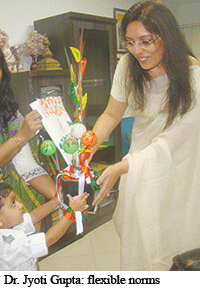 be borne by candidate schools. IB is the only school examination board worldwide which prescribes mandatory professional training and development of teachers of affiliated schools,” says Priyaamvada Taneja, the Mumbai-based development and recognition (India) manager of IB. A psychology graduate of Rajasthan University and UCLA (USA)-certified career counsellor with over a decade’s experience of counselling in top-ranked schools in India (Maharajah Sawai Mansingh, Jaipur; Pathways, Noida and The British School, Delhi), Taneja signed up with IB in 2012.
be borne by candidate schools. IB is the only school examination board worldwide which prescribes mandatory professional training and development of teachers of affiliated schools,” says Priyaamvada Taneja, the Mumbai-based development and recognition (India) manager of IB. A psychology graduate of Rajasthan University and UCLA (USA)-certified career counsellor with over a decade’s experience of counselling in top-ranked schools in India (Maharajah Sawai Mansingh, Jaipur; Pathways, Noida and The British School, Delhi), Taneja signed up with IB in 2012.
In the early years of the new millennium when the IB curriculum and affiliation began to be seriously marketed in India, there was considerable resistance. The subsidies-addicted Indian middle class was slow to take to it because the European exam board’s relatively high affiliation, teacher training and assessment fees drove up tuition fees. That’s why in India, the majority of affiliated schools tend to be very high-end with some such as the superbly-equipped Ecole Mondiale World School, Mumbai, Indus International, Bangalore and Pathways, Noida levying annual tuition fees of Rs.8 lakh-plus for day scholars.
But post-liberalisation India’s upper middle class is now becoming aware that high-quality internationally comparable K-12 education — like higher education abroad — won’t come at rock-bottom third world prices. This perhaps explains why the number of IB schools in India has risen impressively from a dozen in the early noughties to 137 currently. And although most of them offer the IB school-leaving diploma, the number of IB continuum, i.e, full-fledged primary to diploma schools countrywide has grown to 25.
“Despite parents across the country protesting tuition fee increases that one reads about, a small but growing minority of parents are becoming accustomed to the idea that if they want high quality education for their children, they have to pay for it. All parents accept that the IB primary and higher secondary curriculum we offer our children is excellent, and the highly professional teacher training programmes delivered by IB experts are necessary to complement the board’s curriculums. Moreover, the IB management is flexible about the norms it imposes on candidate schools. For instance, in our case after careful scrutiny and investigation, the board has relaxed its teacher-pupil norm to enable us to keep our primary school fees low. W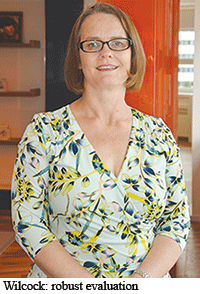 e have also discovered that IB’s online teacher training programmes are very cost-effective,” says Jyoti Gupta, an economics and computer science postgrad of Delhi University, founder-principal of DPS, Sushant Lok, Delhi and currently principal of DPS, Ghaziabad (estb.1980), which she says hosts the world’s largest IB primary school with 2,200 students.
e have also discovered that IB’s online teacher training programmes are very cost-effective,” says Jyoti Gupta, an economics and computer science postgrad of Delhi University, founder-principal of DPS, Sushant Lok, Delhi and currently principal of DPS, Ghaziabad (estb.1980), which she says hosts the world’s largest IB primary school with 2,200 students.
For affiliation applicant schools, budgeting for IB approved and administered training is important, because if students are not thoroughly mentored and prepared, they could flounder on the shoals of the rigorous IB Diploma exam. Good grades are necessary for ready acceptance into top-ranked universities which are willing — indeed eager — to welcome IB certified school-leavers, often with generous scholarships.
According to Paula Wilcock, the chief assessment officer of IB who heads the board’s 164-strong assessment team based in Cardiff (UK), over the past half century IB has designed a robust transnational student evaluation system “which has a positive effect on teaching and learning”.
“In IB’s assessment division, we are well aware that what’s important to measure is not easy to measure. Therefore the distinguishing characteristic of our system is that we don’t reward students’ knowledge as much as their knowledge acquisition and application skills. Our prime objective is to evaluate whether students writing our examinations can think critically and have developed problem-solving skills,” says Wilcock, an education management postgrad of Leicester University with valuable teaching experience in underprivileged schools in Zimbabwe, the Middle East and South Africa before she was appointed IB’s chief assessment officer in 2011 and supervises 11,000 examiners worldwide.
Another admirable feature of IB’s top management is readiness to experiment with new programmes and structural organisation changes in the cause of improved learning outcomes. For instance in 2006, a fourth programme was introduced in addition to its PYP, MYP, IB Diploma curriculums — the IB Career-related certificate which was re-launched as the IB Career programme in 2014.
Under this newly introduced programme, higher secondary students who have made a career choice are allowed to tag on intensive study and internships in their chosen industry or vocation to their IB core curricular programme, and at the end of two years are awarded an IB-CP certificate specifying their chosen subject of study. Moreover earlier this year, acknowledging the support and development needs of affiliated institutions — now known as IB World Schools — are school rather than geography-specific, the board abolished its regional governance structure under which affiliated schools in Asia and Americas were serviced by regional offices in Singapore and Washington DC.
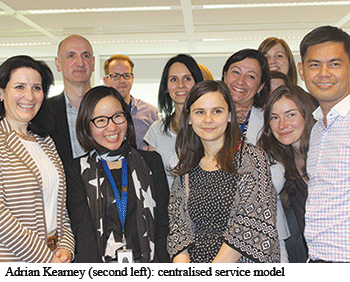 Each IB World School differs from the other and has its own identity. Therefore, the support and development needs of every school vary according to its own peculiar requirements rather than common geography factors. This was the logic behind the reorganisation of the regional governance to a centralised model for our 4,632 affiliated schools worldwide in March this year. Henceforth, every IB World School will have a relationship manager reporting to the IB Global Centre in The Hague from where we will provide the school enhancement and supportive services it requires. Simultaneously, we will encourage heads and teachers of affiliated schools to network, build bridges and share best practices to ensure that our schools become truly global and each as good as the other,” says Adrian Kearney, an alum of Lancaster, Brighton and Reading universities, former English and IELTS manager (Europe) of CIE (UK), and IB regional director in Africa, Europe and Middle East who was promoted to the office of director of IB World Schools last year.
Each IB World School differs from the other and has its own identity. Therefore, the support and development needs of every school vary according to its own peculiar requirements rather than common geography factors. This was the logic behind the reorganisation of the regional governance to a centralised model for our 4,632 affiliated schools worldwide in March this year. Henceforth, every IB World School will have a relationship manager reporting to the IB Global Centre in The Hague from where we will provide the school enhancement and supportive services it requires. Simultaneously, we will encourage heads and teachers of affiliated schools to network, build bridges and share best practices to ensure that our schools become truly global and each as good as the other,” says Adrian Kearney, an alum of Lancaster, Brighton and Reading universities, former English and IELTS manager (Europe) of CIE (UK), and IB regional director in Africa, Europe and Middle East who was promoted to the office of director of IB World Schools last year.
On the eve of its 50th anniversary, this international school affiliating and examinations board, which was presciently established in Geneva in 1968 — when cold war tensions between the democracies of the West and the communist nations led by the Soviet Union were at their zenith — to educate the young generation about the virtues of global peace, cooperation and respect for all cultures, seems to have become more sure-footed and purposeful in the emerging global market for goods and services. As testified by the 4,632 schools worldwide which have chosen to sign up as affiliates, and the incremental willingness of educationally aware households and governments to adopt the IB way of school learning despite the high costs, this mainland Europe school examinations board has established a robust foundation for future growth.
“In IB we have never been in the business of aggressively marketing ourselves. Instead over the past 50 years, we have focused upon contemporising our curriculums and school support and enhancement services. Therefore today we are in the fortunate position of global acceptance of the IB philosophy by private education providers and governments — government schools constitute the majority of IB schools — approaching us for affiliation and support services. For instance, the governments of Japan and Peru have recently invited us to aid and advise them for introducing the IB way of learning in their state schools. Against this backdrop our challenge is to maintain high teaching-learning standards in the growing number of IB World Schools and to simultaneously reduce teacher training costs, so that a larger number of schools in developing countries adopt the IB way of school education. I believe this will become possible through new digital technologies. We are intensively researching this option,” says Dr. Siva Kumari, the tech-savvy director-general of IB.
For managers and administrators of India’s 33 school exam boards — including the pan-India CISCE and CBSE — defined by oriental inertia, bureaucratic red tape and obsolete curriculums which continue to encourage and reward memorisation — and also to parents and the Central and state governments, the rapid rise and development of IB into arguably the world’s most admired transnational school examinations board offers valuable lessons in curriculum innovation and implementation. The national interest demands these lessons are learned.
“We’re expanding our suite of services”
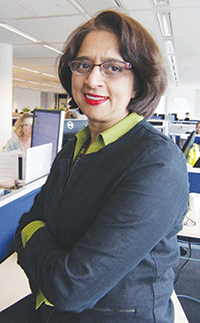 Dilip Thakore interviewed Dr. Siva Kumari, director-general of IB, at The Hague. Excerpts:
Dilip Thakore interviewed Dr. Siva Kumari, director-general of IB, at The Hague. Excerpts:
What were the prime objectives which prompted the launch of the International Baccalaureate Organisation in 1968?
Fifty years ago, the highly prescient founders of the IBO — now known as the IB — saw the need to educate a young generation with a global perspective who would become problem-solvers committed to world peace and cooperation. They designed a school-leaving higher secondary curriculum to develop young people who acquire the skills, values and knowledge necessary to build a better world. Their objective was to build a worldwide community of students, educators and schools with a shared mission of not only excelling in education but also of nurturing human values. The programme was a mix of rigour in academics, critical thinking and humanistic debate.
How satisfied are you that these objectives of the founding fathers have been attained?
Over the past five decades due to the dedicated effort of the IB educators community, the IB has evolved into a full-spectrum school education organisation, providing well-designed curricula to 4,725 affiliated primary to higher secondary schools in 153 countries. And the focus of the IB — a non-profit foundation — is not restricted to private schools, as popularly believed. A large and growing number of government schools in the US, Australia, Japan, Peru and The Netherlands are also affiliated with us.
The number of IB schools in India has grown from a handful in the 1990s to over 130 currently. How satisfied are you with this pace of growth?
We are satisfied with the steady growth of IB World Schools in India. Students in India now have access to intellectually rigorous and internationally benchmarked programmes. It’s important to note the IB prepares students for life rather than examinations. IB teachers mentor students how to learn, acquire and apply knowledge and transform into problem-solvers who can adapt to changing socio-economic situations.
The IB’s school-leaving Diploma programme has proved popular around the world. To what factors do you attribute this phenomenon?
The IB Diploma programme prepares students around the world to attain high standards in internationally benchmarked education. This is our core strength, and our diploma is accepted as a reliable and recognised international assessment of school-leaving competencies in universities and by governments around the world. The pre-university Diploma programme contains elements of study which are unique to the IB. Students not only study a wider range of subjects than prescribed by other national and international examination boards, but they are also trained in independent research and in choosing projects which have real-world impact. When they complete the IB Diploma programme, they are equipped with core research and critical thinking skills required of undergraduate students, giving them clear advantage.
IB affiliation and teacher training programme fees tend to be higher than those of other international examination boards. This restricts the growth of IB-affiliated schools, especially in developing countries. What’s your comment?
Yes, we are aware of feedback from our schools about the cost of IB teacher training. But our teacher development programmes are necessary to prepare teachers for IB-style teaching. Over the years, we have developed a large network of teacher educators throughout the world who peer-teach our new schools. Sharing best practices across international boundaries is also an invaluable component of the teacher development services we offer. That said, we are continually developing lower cost teacher training programmes. As the IB community in India grows, IB World Schools will be encouraged to share good practices and thus become a strong community on the ground.
What are the IB’s future growth and development plans?
As parents continue to understand the need for international education, we believe our mission will be widely accepted because we provide schools a seamless experience to achieve higher teaching and learning goals. We believe the world, now more than ever, needs education that is truly international and addresses the challenges and opportunities presented by an increasingly inter-connected world in which human minds need to be trained very differently.
We will remain at the cutting edge of education innovation, because developing the whole child in a fast-changing global environment demands a range of new and ever evolving solutions. We will expand our suite of services to schools to support impactful teaching and learning, and finally, we will train and develop teachers around the world to ensure that high quality IB teachers are available to support the growth of our affiliated schools and enable them to maintain the high standards that educators worldwide expect of IB.